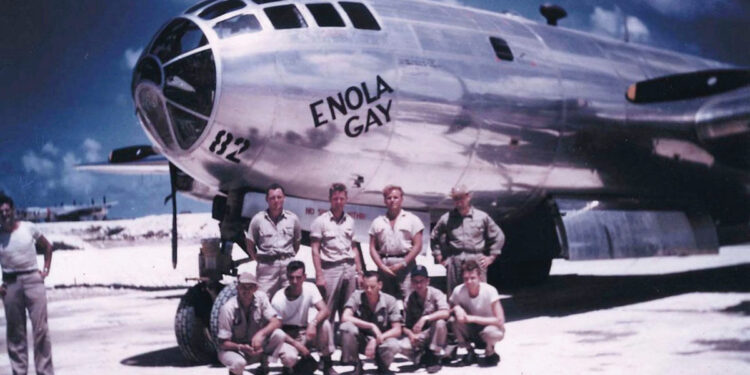On August 6, 1945, the United States unleashed a weapon of unprecedented destructive power on the Japanese city of Hiroshima. The atomic bomb, codenamed “Little Boy,” marked the first use of nuclear weapons in warfare and ushered in the atomic age.
As World War II raged on in the Pacific, the U.S. sought a way to bring a swift end to the conflict. The Manhattan Project, a secret research and development program, had succeeded in creating the world’s first nuclear weapons. President Harry S. Truman, faced with the prospect of a prolonged and bloody invasion of Japan, authorized the use of this new weapon.
At 8:15 a.m. local time, the B-29 bomber Enola Gay, piloted by Colonel Paul Tibbets, dropped the uranium gun-type bomb over Hiroshima. The explosion, equivalent to about 15,000 tons of TNT, instantly devastated the city. The blast, heat, and radiation killed an estimated 70,000 to 80,000 people immediately, with tens of thousands more dying in the following months due to injuries and radiation exposure.

The bombing obliterated much of Hiroshima’s infrastructure, leaving a two-kilometer radius of near-total destruction. The iconic “shadow” images of vaporized victims and the skeletal dome of the Prefectural Industrial Promotion Hall (now the Hiroshima Peace Memorial) became enduring symbols of the bomb’s power and the horrors of nuclear warfare.
The attack on Hiroshima, followed three days later by a plutonium implosion-type bomb dropped on Nagasaki, led to Japan’s surrender on August 15, 1945, effectively ending World War II. However, the bombings remain highly controversial, sparking intense debates about their necessity, morality, and long-term consequences.
In the aftermath, Hiroshima became a symbol of peace and nuclear disarmament. The city was rebuilt and now hosts the Hiroshima Peace Memorial Park and Museum, dedicated to documenting the attack and advocating for a world free of nuclear weapons.
The bombing of Hiroshima forever changed the course of history, demonstrating the terrifying potential of nuclear weapons and profoundly impacting international relations, military strategy, and the collective human conscience. Its legacy continues to shape global politics and discussions on nuclear proliferation, serving as a stark reminder of the devastating consequences of nuclear warfare.
newshub



Recent Comments